A New Dawn in our Understanding Kink and Mental Health
Big news! The new Diagnostic and Statistical Manual of Mental Disorders - or the DSM as it's more commonly known - will change the way kink is defined in terms of mental health. The current version lists any type of sexual interest and activity that is not solely focused on people and their genitals as paraphilias. This allows for the claim that people who have such interests may be mentally ill when really, they are probably completely normal healthy people who just happen to get turned on by feet, or diapers, or balloons, or whatever the case may be. The DSM-5, which is coming out in May, still defines those things as paraphilias but then contains a new category - of paraphilic disorders. Paraphilias are things happily and healthily and consensually enjoyed by those who participate. A paraphilic disorder is a paraphilia which causes distress or harm to the person who is practicing it or to others. I know, that's still really open to interpretation but this is a great move. It is a statement by the most influential mental health professionals in North America that kinky sex and BDSM is not, in and of itself, unhealthy. Just like any other activity or interest, it's only unhealthy if it's hurting the person who does it or other people involved. This will be of great help to those who find themselves unfairly persecuted because of their sexual interests like people who lose their jobs when bosses or co-workers find out they're kinky or parents who lose custody or visitation rights - and yes, this does happen. Now, anyone who tries to use someone's sexual interests against them will not necessarily have the support of the DSM, they will have to show that there is actual harm.
The best step, I think, would have been for the concept of paraphilia to have been left out entirely as it's clear from the explanation above that if the paraphilia isn't causing any distress to anyone, it's no big deal and doesn't need to be discussed and if the paraphilia is causing distress, there's an underlying issue completely unrelated to the paraphilia as evidenced by the fact that lots of people have paraphilias and have no problems with them. In the case of a paraphilic disorder, it's much more likely that the person has some other issue such as obsessive compulsive disorder, depression, bipolar disorder, coping issues, stress, that are expressing themselves around the fetish or kink. It's not the kink that's the issue, it's the thing that's driving the distressing expression of the kink that's the issue. So this new categorization isn't perfect, to be sure, but at least it's a step forward in the recognition that lots of people have kinks, lots of people are into BDSM, and they are not, because of this, sick, weird, mentally ill, dangerous or abnormal. I think we should call it a small victory for now.
Here's an article with more information.
The best step, I think, would have been for the concept of paraphilia to have been left out entirely as it's clear from the explanation above that if the paraphilia isn't causing any distress to anyone, it's no big deal and doesn't need to be discussed and if the paraphilia is causing distress, there's an underlying issue completely unrelated to the paraphilia as evidenced by the fact that lots of people have paraphilias and have no problems with them. In the case of a paraphilic disorder, it's much more likely that the person has some other issue such as obsessive compulsive disorder, depression, bipolar disorder, coping issues, stress, that are expressing themselves around the fetish or kink. It's not the kink that's the issue, it's the thing that's driving the distressing expression of the kink that's the issue. So this new categorization isn't perfect, to be sure, but at least it's a step forward in the recognition that lots of people have kinks, lots of people are into BDSM, and they are not, because of this, sick, weird, mentally ill, dangerous or abnormal. I think we should call it a small victory for now.
Here's an article with more information.

